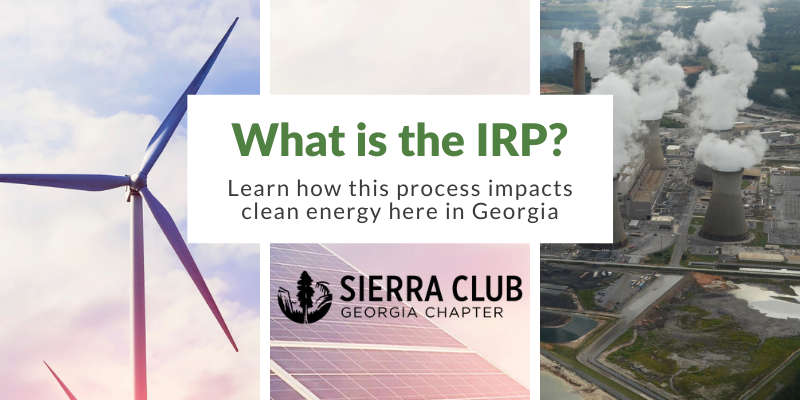
Do you want to advocate for more clean energy here in Georgia? Would you like to see toxic coal ash disposed of properly and ensure that Georgia Power pays their fair share of the clean-up costs? Are you starting to notice the shift in Georgia’s climate and want to take action, but aren’t sure where to start?
Every Georgian who pays a power bill each month should have a say in where that electricity comes from. One of the most effective ways to get involved in the fight for Georgia’s clean energy future is coming up this year, and we have a wide range of opportunities for you to get involved, from sending an email to your elected officials to writing a letter to the editor to speaking at a public hearing and more.
Every three years, Georgia Power has to prepare an update to its Integrated Resource Plan, also known as the IRP. The IRP outlines how Georgia Power will generate the electricity it will sell to its customers for the next 20 years, deciding whether that electricity comes from clean, renewable sources or from dirty fossil fuels like coal and gas.
By the end of January 2022, Georgia Power is required to file its update to this long term energy plan. The utility’s proposal will then be reviewed by the Georgia Public Service Commission, a five-member, elected, governmental body responsible for regulating utilities in Georgia, including electric, natural gas, and telecommunications services.
After receiving Georgia Power’s initial IRP filing, the Public Service Commission, or PSC, will hold hearings and receive testimony about the plan, including comments from the public, before voting to approve a final version of the IRP. Remember: Georgia Power’s filing is just a proposal, we (the public) have the opportunity to advocate for our priorities with our elected officials on the PSC.
The IRP process is one of the most significant ways we can influence the energy future of Georgia. We can push for increased energy efficiency, an expansion of clean, renewable energy, the closure of coal-fired power plants, and the safe clean up of toxic coal ash.
For example, the last IRP cycle in 2019 resulted in many wins for our state’s clean energy future:
- Georgia Power agreed to shut down four coal-fired units at Plant Hammond outside Rome and one unit at Plant McIntosh
- No new natural gas infrastructure
- A 72% increase in the amount of renewable energy online and a doubling of solar energy production
- A commitment to retrofit 500 homes total between Athens and Atlanta to improve energy efficiency
While these were promising developments, there is still a long way to go. Despite agreeing to close down some significant coal-fired units, Georgia is still home to some of the largest coal-powered plants in the country. The increase in clean energy is encouraging, but renewable energy sources still represent only 22 percent of Georgia Power’s overall energy portfolio.
The 2022 IRP process began in January. This time around, we are looking to maximize solar at the utility scale, retire more coal-burning plants, dramatically increase the number of homes receiving energy efficiency measures, and hold strong for no new natural gas. Will you join us?
Sign up to join our 2022 IRP team at this link, and we’ll let you know when the public has the opportunity to comment on the process. We will provide templates for how to send an effective message to the PSC. We’ll also give you all the information and tools you’ll need through trainings and informational posts like this one. Join our 2022 IRP team and help us fight for Georgia’s clean energy future!